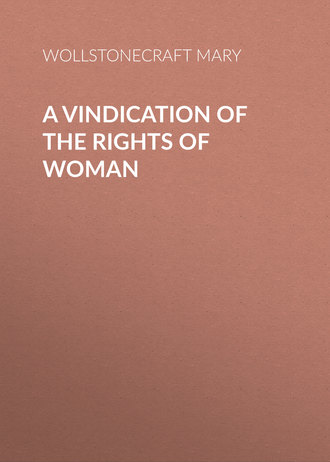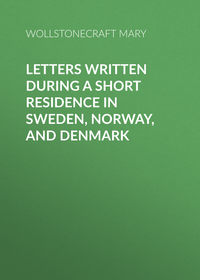 полная версия
полная версияA Vindication of the Rights of Woman
Let me now, as from an eminence, survey the world stripped of all its false delusive charms. The clear atmosphere enables me to see each object in its true point of view, while my heart is still. I am calm as the prospect in a morning when the mists, slowly dispersing, silently unveil the beauties of nature, refreshed by rest.
In what light will the world now appear? I rub my eyes and think, perchance, that I am just awaking from a lively dream.
I see the sons and daughters of men pursuing shadows, and anxiously wasting their powers to feed passions which have no adequate object—if the very excess of these blind impulses pampered by that lying, yet constantly-trusted guide, the imagination, did not, by preparing them for some other state, render short sighted mortals wiser without their own concurrence; or, what comes to the same thing, when they were pursuing some imaginary present good.
After viewing objects in this light, it would not be very fanciful to imagine, that this world was a stage on which a pantomime is daily performed for the amusement of superiour beings. How would they be diverted to see the ambitious man consuming himself by running after a phantom, and, pursuing the bubble fame in "the cannon's mouth" that was to blow him to nothing: for when consciousness is lost, it matters not whether we mount in a whirlwind or descend in rain. And should they compassionately invigorate his sight, and show him the thorny path which led to eminence, that like a quicksand sinks as he ascends, disappointing his hopes when almost within his grasp, would he not leave to others the honour of amusing them, and labour to secure the present moment, though from the constitution of his nature he would not find it very easy to catch the flying stream? Such slaves are we to hope and fear!
But, vain as the ambitious man's pursuit would be, he is often striving for something more substantial than fame—that indeed would be the veriest meteor, the wildest fire that could lure a man to ruin. What! renounce the most trifling gratification to be applauded when he should be no more! Wherefore this struggle, whether man is mortal or immortal, if that noble passion did not really raise the being above his fellows?
And love! What diverting scenes would it produce—Pantaloon's tricks must yield to more egregious folly. To see a mortal adorn an object with imaginary charms, and then fall down and worship the idol which he had himself set up—how ridiculous! But what serious consequences ensue to rob man of that portion of happiness, which the Deity by calling him into existence has (or, on what can his attributes rest?) indubitably promised; would not all the purposes of life have been much better fulfilled if he had only felt what has been termed physical love? And, would not the sight of the object, not seen through the medium of the imagination, soon reduce the passion to an appetite, if reflection, the noble distinction of man, did not give it force, and make it an instrument to raise him above this earthy dross, by teaching him to love the centre of all perfection! whose wisdom appears clearer and clearer in the works of nature, in proportion as reason is illuminated and exalted by contemplation, and by acquiring that love of order which the struggles of passion produce?
The habit of reflection, and the knowledge attained by fostering any passion, might be shown to be equally useful though the object be proved equally fallacious; for they would all appear in the same light, if they were not magnified by the governing passion implanted in us by the Author of all good, to call forth and strengthen the faculties of each individual, and enable it to attain all the experience that an infant can obtain, who does certain things, it cannot tell why.
I descend from my height, and mixing with my fellow creatures, feel myself hurried along the common stream; ambition, love, hope, and fear, exert their wonted power, though we be convinced by reason that their present and most attractive promises are only lying dreams; but had the cold hand of circumspection damped each generous feeling before it had left any permanent character, or fixed some habit, what could be expected, but selfish prudence and reason just rising above instinct? Who that has read Dean Swift's disgusting description of the Yahoos, and insipid one of Houyhnhnm with a philosophical eye, can avoid seeing the futility of degrading the passions, or making man rest in contentment?
The youth should ACT; for had he the experience of a grey head, he would be fitter for death than life, though his virtues, rather residing in his head than his heart could produce nothing great, and his understanding prepared for this world, would not, by its noble flights, prove that it had a title to a better.
Besides, it is not possible to give a young person a just view of life; he must have struggled with his own passions before he can estimate the force of the temptation which betrayed his brother into vice. Those who are entering life, and those who are departing, see the world from such very different points of view, that they can seldom think alike, unless the unfledged reason of the former never attempted a solitary flight.
When we hear of some daring crime—it comes full upon us in the deepest shade of turpitude, and raises indignation; but the eye that gradually saw the darkness thicken, must observe it with more compassionate forbearance. The world cannot be seen by an unmoved spectator, we must mix in the throng, and feel as men feel before we can judge of their feelings. If we mean, in short, to live in the world to grow wiser and better, and not merely to enjoy the good things of life, we must attain a knowledge of others at the same time that we become acquainted with ourselves— knowledge acquired any other way only hardens the heart and perplexes the understanding.
I may be told, that the knowledge thus acquired, is sometimes purchased at too dear a rate. I can only answer, that I very much doubt whether any knowledge can be attained without labour and sorrow; and those who wish to spare their children both, should not complain if they are neither wise nor virtuous. They only aimed at making them prudent; and prudence, early in life, is but the cautious craft of ignorant self-love. I have observed, that young people, to whose education particular attention has been paid, have, in general, been very superficial and conceited, and far from pleasing in any respect, because they had neither the unsuspecting warmth of youth, nor the cool depth of age. I cannot help imputing this unnatural appearance principally to that hasty premature instruction, which leads them presumptuously to repeat all the crude notions they have taken upon trust, so that the careful education which they received, makes them all their lives the slaves of prejudices.
Mental as well as bodily exertion is, at first, irksome; so much so, that the many would fain let others both work and think for them. An observation which I have often made will illustrate my meaning. When in a circle of strangers, or acquaintances, a person of moderate abilities, asserts an opinion with heat, I will venture to affirm, for I have traced this fact home, very often, that it is a prejudice. These echoes have a high respect for the understanding of some relation or friend, and without fully comprehending the opinions, which they are so eager to retail, they maintain them with a degree of obstinacy, that would surprise even the person who concocted them.
I know that a kind of fashion now prevails of respecting prejudices; and when any one dares to face them, though actuated by humanity and armed by reason, he is superciliously asked, whether his ancestors were fools. No, I should reply; opinions, at first, of every description, were all, probably, considered, and therefore were founded on some reason; yet not unfrequently, of course, it was rather a local expedient than a fundamental principle, that would be reasonable at all times. But, moss-covered opinions assume the disproportioned form of prejudices, when they are indolently adopted only because age has given them a venerable aspect, though the reason on which they were built ceases to be a reason, or cannot be traced. Why are we to love prejudices, merely because they are prejudices? A prejudice is a fond obstinate persuasion, for which we can give no reason; for the moment a reason can be given for an opinion, it ceases to be a prejudice, though it may be an error in judgment: and are we then advised to cherish opinions only to set reason at defiance? This mode of arguing, if arguing it may be called, reminds me of what is vulgarly termed a woman's reason. For women sometimes declare that they love, or believe certain things, BECAUSE they love, or believe them.
It is impossible to converse with people to any purpose, who, in this style, only use affirmatives and negatives. Before you can bring them to a point, to start fairly from, you must go back to the simple principles that were antecedent to the prejudices broached by power; and it is ten to one but you are stopped by the philosophical assertion, that certain principles are as practically false as they are abstractly true. Nay, it may be inferred, that reason has whispered some doubts, for it generally happens that people assert their opinions with the greatest heat when they begin to waver; striving to drive out their own doubts by convincing their opponent, they grow angry when those gnawing doubts are thrown back to prey on themselves.
The fact is, that men expect from education, what education cannot give. A sagacious parent or tutor may strengthen the body and sharpen the instruments by which the child is to gather knowledge; but the honey must be the reward of the individual's own industry. It is almost as absurd to attempt to make a youth wise by the experience of another, as to expect the body to grow strong by the exercise which is only talked of, or seen.
Many of those children whose conduct has been most narrowly watched, become the weakest men, because their instructors only instill certain notions into their minds, that have no other foundation than their authority; and if they are loved or respected, the mind is cramped in its exertions and wavering in its advances. The business of education in this case, is only to conduct the shooting tendrils to a proper pole; yet after laying precept upon precept, without allowing a child to acquire judgment itself, parents expect them to act in the same manner by this borrowed fallacious light, as if they had illuminated it themselves; and be, when they enter life, what their parents are at the close. They do not consider that the tree, and even the human body, does not strengthen its fibres till it has reached its full growth.
There appears to be something analogous in the mind. The senses and the imagination give a form to the character, during childhood and youth; and the understanding as life advances, gives firmness to the first fair purposes of sensibility—till virtue, arising rather from the clear conviction of reason than the impulse of the heart, morality is made to rest on a rock against which the storms of passion vainly beat.
I hope I shall not be misunderstood when I say, that religion will not have this condensing energy, unless it be founded on reason. If it be merely the refuge of weakness or wild fanaticism, and not a governing principle of conduct, drawn from self-knowledge, and a rational opinion respecting the attributes of God, what can it be expected to produce? The religion which consists in warming the affections, and exalting the imagination, is only the poetical part, and may afford the individual pleasure without rendering it a more moral being. It may be a substitute for worldly pursuits; yet narrow instead of enlarging the heart: but virtue must be loved as in itself sublime and excellent, and not for the advantages it procures or the evils it averts, if any great degree of excellence be expected. Men will not become moral when they only build airy castles in a future world to compensate for the disappointments which they meet with in this; if they turn their thoughts from relative duties to religious reveries.
Most prospects in life are marred by the shuffling worldly wisdom of men, who, forgetting that they cannot serve God and mammon, endeavour to blend contradictory things. If you wish to make your son rich, pursue one course —if you are only anxious to make him virtuous, you must take another; but do not imagine that you can bound from one road to the other without losing your way.8
CHAPTER 6.
THE EFFECT WHICH AN EARLY ASSOCIATION OF IDEAS HAS UPON THE CHARACTER
Educated in the enervating style recommended by the writers on whom I have been animadverting; and not having a chance, from their subordinate state in society, to recover their lost ground, is it surprising that women every where appear a defect in nature? Is it surprising, when we consider what a determinate effect an early association of ideas has on the character, that they neglect their understandings, and turn all their attention to their persons?
The great advantages which naturally result from storing the mind with knowledge, are obvious from the following considerations. The association of our ideas is either habitual or instantaneous; and the latter mode seems rather to depend on the original temperature of the mind than on the will. When the ideas, and matters of fact, are once taken in, they lie by for use, till some fortuitous circumstance makes the information dart into the mind with illustrative force, that has been received at very different periods of our lives. Like the lightning's flash are many recollections; one idea assimilating and explaining another, with astonishing rapidity. I do not now allude to that quick perception of truth, which is so intuitive that it baffles research, and makes us at a loss to determine whether it is reminiscence or ratiocination, lost sight of in its celerity, that opens the dark cloud. Over those instantaneous associations we have little power; for when the mind is once enlarged by excursive flights, or profound reflection, the raw materials, will, in some degree, arrange themselves. The understanding, it is true, may keep us from going out of drawing when we group our thoughts, or transcribe from the imagination the warm sketches of fancy; but the animal spirits, the individual character give the colouring. Over this subtile electric fluid,9 how little power do we possess, and over it how little power can reason obtain! These fine intractable spirits appear to be the essence of genius, and beaming in its eagle eye, produce in the most eminent degree the happy energy of associating thoughts that surprise, delight, and instruct. These are the glowing minds that concentrate pictures for their fellow-creatures; forcing them to view with interest the objects reflected from the impassioned imagination, which they passed over in nature.
I must be allowed to explain myself. The generality of people cannot see or feel poetically, they want fancy, and therefore fly from solitude in search of sensible objects; but when an author lends them his eyes, they can see as he saw, and be amused by images they could not select, though lying before them.
Education thus only supplies the man of genius with knowledge to give variety and contrast to his associations; but there is an habitual association of ideas, that grows "with our growth," which has a great effect on the moral character of mankind; and by which a turn is given to the mind, that commonly remains throughout life. So ductile is the understanding, and yet so stubborn, that the associations which depend on adventitious circumstances, during the period that the body takes to arrive at maturity, can seldom be disentangled by reason. One idea calls up another, its old associate, and memory, faithful to the first impressions, particularly when the intellectual powers are not employed to cool our sensations, retraces them with mechanical exactness.
This habitual slavery, to first impressions, has a more baneful effect on the female than the male character, because business and other dry employments of the understanding, tend to deaden the feelings and break associations that do violence to reason. But females, who are made women of when they are mere children, and brought back to childhood when they ought to leave the go-cart forever, have not sufficient strength of mind to efface the superinductions of art that have smothered nature.
Every thing that they see or hear serves to fix impressions, call forth emotions, and associate ideas, that give a sexual character to the mind. False notions of beauty and delicacy stop the growth of their limbs and produce a sickly soreness, rather than delicacy of organs; and thus weakened by being employed in unfolding instead of examining the first associations, forced on them by every surrounding object, how can they attain the vigour necessary to enable them to throw off their factitious character?—where find strength to recur to reason and rise superior to a system of oppression, that blasts the fair promises of spring? This cruel association of ideas, which every thing conspires to twist into all their habits of thinking, or, to speak with more precision, of feeling, receives new force when they begin to act a little for themselves; for they then perceive, that it is only through their address to excite emotions in men, that pleasure and power are to be obtained. Besides, all the books professedly written for their instruction, which make the first impression on their minds, all inculcate the same opinions. Educated in worse than Egyptian bondage, it is unreasonable, as well as cruel, to upbraid them with faults that can scarcely be avoided, unless a degree of native vigour be supposed, that falls to the lot of very few amongst mankind.
For instance, the severest sarcasms have been levelled against the sex, and they have been ridiculed for repeating "a set of phrases learnt by rote," when nothing could be more natural, considering the education they receive, and that their "highest praise is to obey, unargued"—the will of man. If they are not allowed to have reason sufficient to govern their own conduct—why, all they learn—must be learned by rote! And when all their ingenuity is called forth to adjust their dress, "a passion for a scarlet coat," is so natural, that it never surprised me; and, allowing Pope's summary of their character to be just, "that every woman is at heart a rake," why should they be bitterly censured for seeking a congenial mind, and preferring a rake to a man of sense?
Rakes know how to work on their sensibility, whilst the modest merit of reasonable men has, of course, less effect on their feelings, and they cannot reach the heart by the way of the understanding, because they have few sentiments in common.
It seems a little absurd to expect women to be more reasonable than men in their LIKINGS, and still to deny them the uncontroled use of reason. When do men FALL IN LOVE with sense? When do they, with their superior powers and advantages, turn from the person to the mind? And how can they then expect women, who are only taught to observe behaviour, and acquire manners rather than morals, to despise what they have been all their lives labouring to attain? Where are they suddenly to find judgment enough to weigh patiently the sense of an awkward virtuous man, when his manners, of which they are made critical judges, are rebuffing, and his conversation cold and dull, because it does not consist of pretty repartees, or well-turned compliments? In order to admire or esteem any thing for a continuance, we must, at least, have our curiosity excited by knowing, in some degree, what we admire; for we are unable to estimate the value of qualities and virtues above our comprehension. Such a respect, when it is felt, may be very sublime; and the confused consciousness of humility may render the dependent creature an interesting object, in some points of view; but human love must have grosser ingredients; and the person very naturally will come in for its share—and, an ample share it mostly has!
Love is, in a great degree, an arbitrary passion, and will reign like some other stalking mischiefs, by its own authority, without deigning to reason; and it may also be easily distinguished from esteem, the foundation of friendship, because it is often excited by evanescent beauties and graces, though to give an energy to the sentiment something more solid must deepen their impression and set the imagination to work, to make the most fair— the first good.
Common passions are excited by common qualities. Men look for beauty and the simper of good humoured docility: women are captivated by easy manners: a gentleman-like man seldom fails to please them, and their thirsty ears eagerly drink the insinuating nothings of politeness, whilst they turn from the unintelligible sounds of the charmer—reason, charm he never so wisely. With respect to superficial accomplishments, the rake certainly has the advantage; and of these, females can form an opinion, for it is their own ground. Rendered gay and giddy by the whole tenor of their lives, the very aspect of wisdom, or the severe graces of virtue must have a lugubrious appearance to them; and produce a kind of restraint from which they and love, sportive child, naturally revolt. Without taste, excepting of the lighter kind, for taste is the offspring of judgment, how can they discover, that true beauty and grace must arise from the play of the mind? and how can they be expected to relish in a lover what they do not, or very imperfectly, possess themselves? The sympathy that unites hearts, and invites to confidence, in them is so very faint, that it cannot take fire, and thus mount to passion. No, I repeat it, the love cherished by such minds, must have grosser fuel!
The inference is obvious; till women are led to exercise their understandings, they should not be satirized for their attachment to rakes; nor even for being rakes at heart, when it appears to be the inevitable consequence of their education. They who live to please must find their enjoyments, their happiness, in pleasure! It is a trite, yet true remark, that we never do any thing well, unless we love it for its own sake.
Supposing, however, for a moment, that women were, in some future revolution of time, to become, what I sincerely wish them to be, even love would acquire more serious dignity, and be purified in its own fires; and virtue giving true delicacy to their affections, they would turn with disgust from a rake. Reasoning then, as well as feeling, the only province of woman, at present, they might easily guard against exterior graces, and quickly learn to despise the sensibility that had been excited and hackneyed in the ways of women, whose trade was vice; and allurement's wanton airs. They would recollect that the flame, (one must use appropriate expressions,) which they wished to light up, had been exhausted by lust, and that the sated appetite, losing all relish for pure and simple pleasures, could only be roused by licentious arts of variety. What satisfaction could a woman of delicacy promise herself in a union with such a man, when the very artlessness of her affection might appear insipid? Thus does Dryden describe the situation:
"Where love is duty on the female side,On theirs mere sensual gust, and sought with surly pride."But one grand truth women have yet to learn, though much it imports them to act accordingly. In the choice of a husband they should not be led astray by the qualities of a lover—for a lover the husband, even supposing him to be wise and virtuous, cannot long remain.
Were women more rationally educated, could they take a more comprehensive view of things, they would be contented to love but once in their lives; and after marriage calmly let passion subside into friendship—into that tender intimacy, which is the best refuge from care; yet is built on such pure, still affections, that idle jealousies would not be allowed to disturb the discharge of the sober duties of life, nor to engross the thoughts that ought to be otherwise employed. This is a state in which many men live; but few, very few women. And the difference may easily be accounted for, without recurring to a sexual character. Men, for whom we are told women are made, have too much occupied the thoughts of women; and this association has so entangled love, with all their motives of action; and, to harp a little on an old string, having been solely employed either to prepare themselves to excite love, or actually putting their lessons in practice, they cannot live without love. But, when a sense of duty, or fear of shame, obliges them to restrain this pampered desire of pleasing beyond certain lengths, too far for delicacy, it is true, though far from criminality, they obstinately determine to love, I speak of their passion, their husbands to the end of the chapter—and then acting the part which they foolishly exacted from their lovers, they become abject wooers, and fond slaves.






